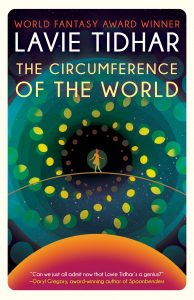Gary K. Wolfe Reviews The Circumference of the World by Lavie Tidhar
 The Circumference of the World, Lavie Tidhar (Tachyon 978-1-61696-362-0, $17.95, 256pp, tp) September 2023. Cover by Elizabeth Story.
The Circumference of the World, Lavie Tidhar (Tachyon 978-1-61696-362-0, $17.95, 256pp, tp) September 2023. Cover by Elizabeth Story.
For an author who I think can lay a reasonable claim to being one of the most innovative voices in modern science fiction, Lavie Tidhar never tires of displaying his affection for some of the older classics of the field. His new novel The Circumference of the World manages in a single sentence to call out (though not quite by name) Asimov, Heinlein, Le Guin, Blish, Herbert, Niven, Cordwainer Smith, and even the relatively obscure George Tucker, and later features fictional correspondence from Campbell, Heinlein, de Camp, Bester, and Merril. Merril and J.G. Ballard show up at a party at Michael Moorcock’s, as well as “some sort of self-styled critic,” “Clute, I think his name was.” None of this is entirely gratuitous (though no doubt Tidhar is having fun), and none is surprising once it becomes apparent that The Circumference of the World is Tidhar’s most direct tribute – and most direct critique – of what is sometimes still called SF’s “golden age.” At the same time, it’s one of his most formally complex novels, featuring stories nested within stories, stories that fold back on themselves, questionable narrators, and some narrators who don’t even seem to know whether they’re reliable or not. All of which seems entirely appropriate in a tale whose pivotal figure is clearly based on the career, and general weirdness, of L. Ron Hubbard.
The novel begins with the childhood of the gifted mathematician Delia Welegtabit on the Pacific island Vanua Lava, during which she discovers an obscure 1962 SF novel, Lode Stars by Eugene Charles Hartley. Years later, as a math professor in London, Delia learns that, while most book dealers claim the novel is apocryphal, it nevertheless has gained a kind of cult following who sees it as some sort of code or secret system. When Delia’s boyfriend Levi Armstrong disappears trying to track it down, she hires rare book dealer Daniel Chase to find both the book and Levi. Despite Chase’s protestations that, with his prosopagnosia, he’s hardly a good candidate for a private eye (even though he sounds a lot like one in the chapters he narrates), he takes on the case. The trail leads to the Russian mobster Oskar Lens, whose extensive pulp art collection includes all the covers of Hartley’s novels, and then shifts to Lens’s own memories of being imprisoned in Siberia before settling in London, where he attended monthly SF pub meetings with Clarke, Pohl, Amis, Moorcock – and Levi Armstrong, who apparently shared his obsession with Hartley.
The novel then navigates a couple of sharp turns, taking us deeper into the world of 20th century SF. We are shown some actual chapters from Lode Stars (one of which is titled “Ten Thousand Light Years from Home”), in which we learn that “lode stars” are Hartley’s term for black holes, that the central character of the novel is named Delia (who we first meet walking “the circumference of the world” in a radically re-engineered far-future solar system), and that Delia’s quest involves something called the Occlude, which somehow protects individuals from the dark forces of the universe. This is followed by a biographical sketch of Hartley, partly in his own words and partly through those letters from Heinlein, Campbell, et al., detailing Hartley’s early involvement with the Astounding crew and the later growth of the Church of the All-Seeing Eye, though in this telling it’s Heinlein who advises Hartley, “if you really want to make a millions bucks, Gene, you should start your own religion.” (It’s fascinating to view these chapters in light of Alec Nevala-Lee’s non-fiction account of the same period in his group biography Astounding). Eventually, the stories of Hartley, Daniel Chase, and Delia weave together in ingenious and oddly touching ways, and even the self-proclaimed prophet and cynical conman Hartley turns out to be more complex than we’d suspected. While much of the resonance of The Circumference of the World demands at least some familiarity with the SF communities of the 1940s and 1950s – one particularly funny scene involves Campbell trying to sell Hartley on his various screwball theories, then proclaiming Hartley a “complete lunatic” when he mentions his own – Tidhar makes clear that SF has never entirely left behind the questions it raised about imagination, belief, science, and pure bunkum, and figures like Hartley have never entirely disappeared. But if Hartley represents a colorful but problematical part of SF’s past, sharp readers like Delia seem to represent a promise of a more inclusive and multicultural future. It’s not a bad tradeoff.
Gary K. Wolfe is Emeritus Professor of Humanities at Roosevelt University and a reviewer for Locus magazine since 1991. His reviews have been collected in Soundings (BSFA Award 2006; Hugo nominee), Bearings (Hugo nominee 2011), and Sightings (2011), and his Evaporating Genres: Essays on Fantastic Literature (Wesleyan) received the Locus Award in 2012. Earlier books include The Known and the Unknown: The Iconography of Science Fiction (Eaton Award, 1981), Harlan Ellison: The Edge of Forever (with Ellen Weil, 2002), and David Lindsay (1982). For the Library of America, he edited American Science Fiction: Nine Classic Novels of the 1950s in 2012, with a similar set for the 1960s forthcoming. He has received the Pilgrim Award from the Science Fiction Research Association, the Distinguished Scholarship Award from the International Association for the Fantastic in the Arts, and a Special World Fantasy Award for criticism. His 24-lecture series How Great Science Fiction Works appeared from The Great Courses in 2016. He has received six Hugo nominations, two for his reviews collections and four for The Coode Street Podcast, which he has co-hosted with Jonathan Strahan for more than 300 episodes. He lives in Chicago.
This review and more like it in the September 2023 issue of Locus.
 While you are here, please take a moment to support Locus with a one-time or recurring donation. We rely on reader donations to keep the magazine and site going, and would like to keep the site paywall free, but WE NEED YOUR FINANCIAL SUPPORT to continue quality coverage of the science fiction and fantasy field.
While you are here, please take a moment to support Locus with a one-time or recurring donation. We rely on reader donations to keep the magazine and site going, and would like to keep the site paywall free, but WE NEED YOUR FINANCIAL SUPPORT to continue quality coverage of the science fiction and fantasy field.
©Locus Magazine. Copyrighted material may not be republished without permission of LSFF.






